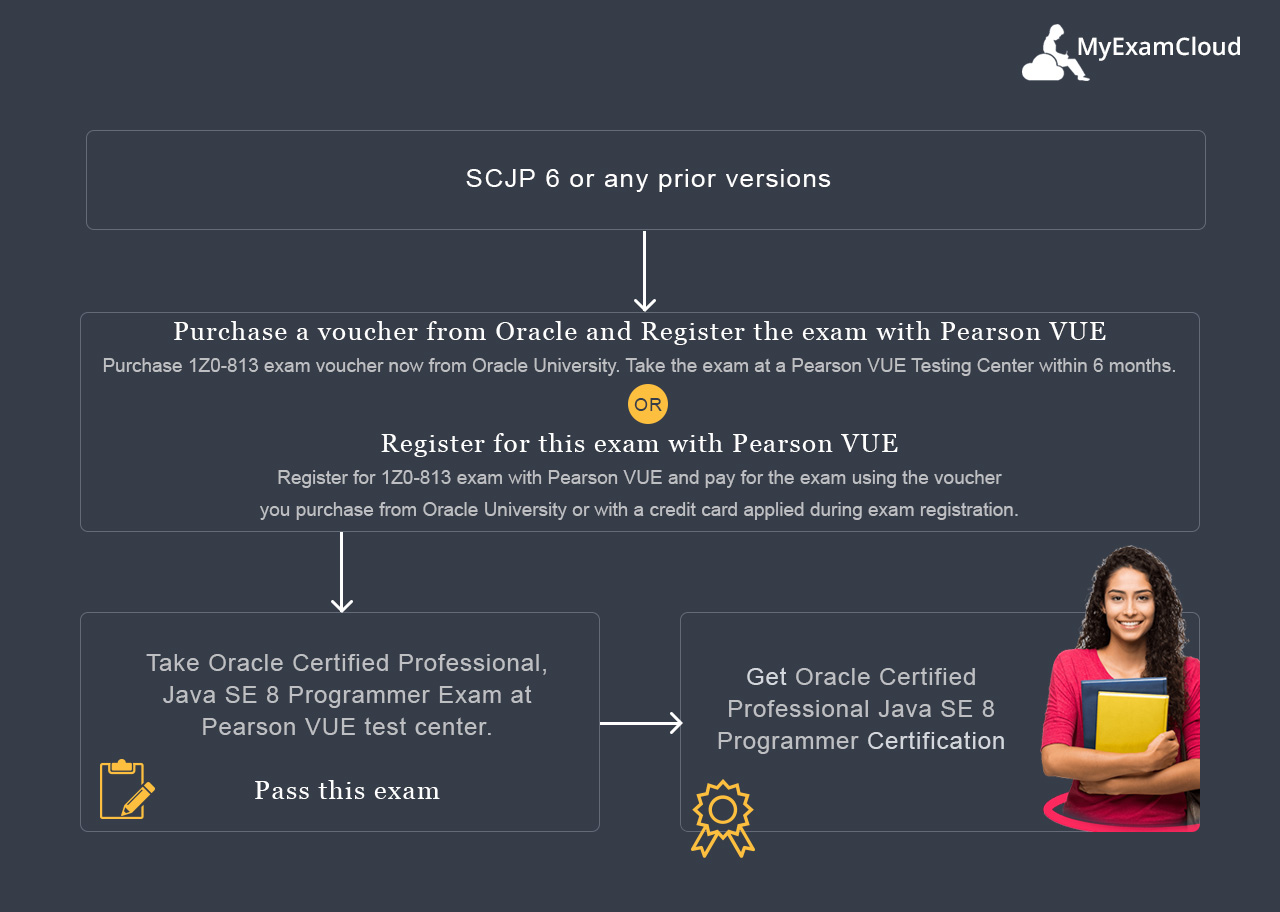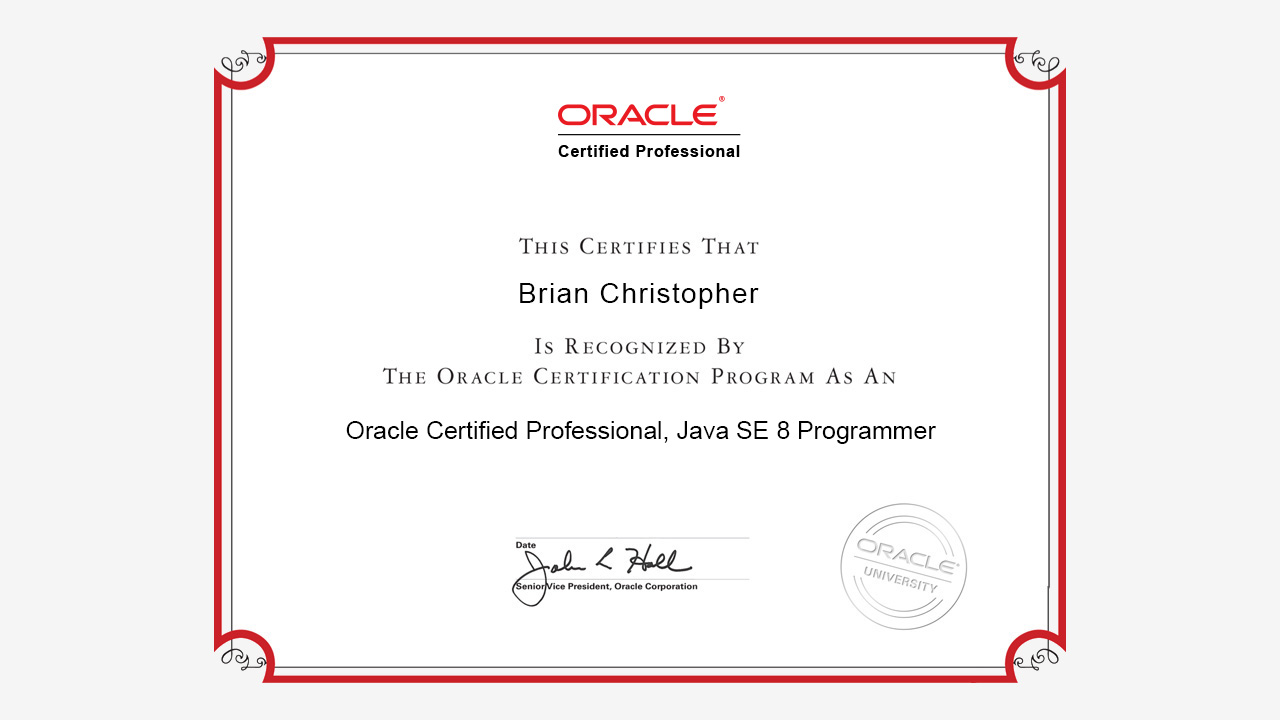54 OCPJP 8 Upgrade (All Versions) Practice Questions - Free
You can access 54 Oracle Certified Professional, Java SE 8 Programmer (Java SE 6 and all prior versions) Practice Questions, from MyExamCloud Exam Simulator
Take Free Practice Testfor Oracle Certified Professional, Java SE 8 Programmer (Java SE 6 and all prior versions) Certification
MyExamCloud OCPJP 8 Upgrade (All Versions) Practice Tests helps you to pass the exam in first attempt. Prepare with one of the best OCPJP 8 Upgrade (All Versions) Study Course developed by Java Certified Experts. 100% Test Pass Guarantee.
OCPJP 8 Upgrade (All Versions) Practice Tests and eBooks are available online at MyExamCloud Exam Simulator. This course contents can be accessed from PC, Mac, iPhone®, iPad®, Android™ Device. Mobile Apps available on iTunes and Android stores.
Inside MyExamCloud's OCPJP 8 Upgrade (All Versions) Practice Course
Set Goals on OCPJP 8 exam topics
(MyExamCloud PPA Tracker)
7 Full length mock exams
(MyExamCloud Practice Exams)
1 Free Trial mock exam
(MyExamCloud Practice Exam)
Study mode to access topic based questions
Exhaustive explanation with every question
Reports to assess performance history, strengths & weaknesses
Track your goals
Focus lab to pinpoint your weak areas
Unlimited lifetime Access
The OCPJP 8 Upgrade (All Versions) Practice Questions and study notes are created by highly qualified and Java Certified experts. The Authors has created this online course covering all Java SE 8 Programmer II exam objectives based on latest Oracle's changes.
The OCPJP 8 Upgrade (All Versions) - (Oracle Certified Professional, Java SE 8 Programmer (Java SE 6 and all prior versions)) certification improves object-orientated programming and Java fundamental skills. This Java Certification also tests Java SE 8 new features such as 'Lambda expressions', 'Streams', 'Concurrenyc' and 'Date and Time API'. As Java Language Specification has been updated for these new features, the experienced Java developers also need to learn the new style of coding by preparing for this exam.
Lambda Expressions, a new language feature, has been introduced in this release. They enable you to treat functionality as a method argument, or code as data. Lambda expressions let you express instances of single-method interfaces (referred to as functional interfaces) more compactly.
Method references provide easy-to-read lambda expressions for methods that already have a name.
Default methods enable new functionality to be added to the interfaces of libraries and ensure binary compatibility with code written for older versions of those interfaces
Classes in the new java.util.stream package provide a Stream API to support functional-style operations on streams of elements. The Stream API is integrated into the Collections API, which enables bulk operations on collections, such as sequential or parallel map-reduce transformations.
Classes and interfaces have been added to the java.util.concurrent package.
Methods have been added to the java.util.concurrent.ConcurrentHashMap class to support aggregate operations based on the newly added streams facility and lambda expressions.
Classes have been added to the java.util.concurrent.atomic package to support scalable updatable variables.
Methods have been added to the java.util.concurrent.ForkJoinPool class to support a common pool.
The java.util.concurrent.locks.StampedLock class has been added to provide a capability-based lock with three modes for controlling read/write access.

Passing this exam, one can achieve Oracle Certified Professional, Java SE 8 Programmer (Java SE 6 and all prior versions) from Oracle. The real exam tests your OO and Java SE 8 skills by Single and Multiple choice questions.
| Number of Questions: | 60 Questions |
|---|---|
| Exam Duration | 130 Minutes |
| Passing Score: | 63% |
| Exam Format | Multiple Choice (which can have single or multiple answers) |
| Validated Against | Java SE 8 |
| Exam Price | Price May vary from Country to country. Refer Oracle site for latest pricing. |
The Upgrade to Java SE 8 OCP (Java SE 6 and all prior versions) exam format is multiple choice (which can have single or multiple answers).
The real exam is a computer based test provided by pearsonvue and it can be taken from any local test centers in your country.
Set The New Java Standard With Java SE 8 OCA Certification Java SE 8 significantly changes the way you write code. Java SE 8 Certification gives you the tools to make the most of new features. The Java SE 8 Oracle Certified Associate (OCA) certification provides a foundational understanding of Java as well as programming in general. So it suits for most Java Professionals starting from beginner to expert.
The following practice question is taken from MyExamCloud OCPJP 8 Upgrade (All Versions) Study Plan.
|
Given: 1. import java.util.HashMap;
What is the output? ChoicesChoice A:{1=one, 2=Two, 3=Three, 4=Four}
Choice B:{1=one, 2=Two}
Choice C:{3=Three, 4=Four}
Choice D:Compilation fails due to error at line 16
Choice E:Compilation fails due to error at line 18
|
Answer and Explanation:Choice A is correctFrom Java SE 1.8, we have a new method called merge that can use to merge two maps together. If the specified key is not already associated with a value or is associated with null, associates it with the given non-null value. Otherwise, replaces the associated value with the results of the given remapping function, or removes if the result is null. In give code we have created Function instance and a Exam Objective: Java File I/O (NIO.2) - Use Stream API with NIO.2 Oracle Reference: https://docs.oracle.com/javase/8/docs/api/java/util/Map.html#merge-K-V-java.util.function.BiFunction- |
You can access 54 Oracle Certified Professional, Java SE 8 Programmer (Java SE 6 and all prior versions) Practice Questions, from MyExamCloud Exam Simulator
Take Free Practice TestWithin 30 minutes of completing your OCPJP 8 Upgrade (All Versions) Certification exam, you will receive an email from Oracle notifying you that your exam results are available in CertView. If you have previously authenticated your CertView account, simply login and select the option to "See My New Exam Result Now."
If you have not authenticated your CertView account yet at this point, you will need to proceed with your account authentication.
Authentication requires an Oracle Single Sign On username and password and the following information from your Pearson VUE profile: email address and Oracle Testing ID. You will be taken to CertView to log in once your account has been authenticated.

The reason for taking Oracle Java Certification is to differentiate general programmers from certified experts. You may get additional benefits like getting a good job, salary hike, designation changes, role changes and higher promotion.
Stand out from the millions of Java crowd. Increase your marketability with OCPJP 7 Upgrade Certification on the most used programming language in the world - Java.
Related Articles: https://www.epractizelabs.com/myexamcloud/2017/04/20/oracle-java-certification-exam-preparation/
Congrats, you have successfully scheduled your Java Certification exam.
The real exam questions assumes the following:
|
Language Enhancements
Concurrency
Localization
Java File I/O (NIO.2)
Lambda
Java Collections
Java Streams
|

I found the Training Lab Exams to be fantastic! The questions were more intense than the actual exams. It has become a common practice for the training staff at our company to recommend your products. Thanks!